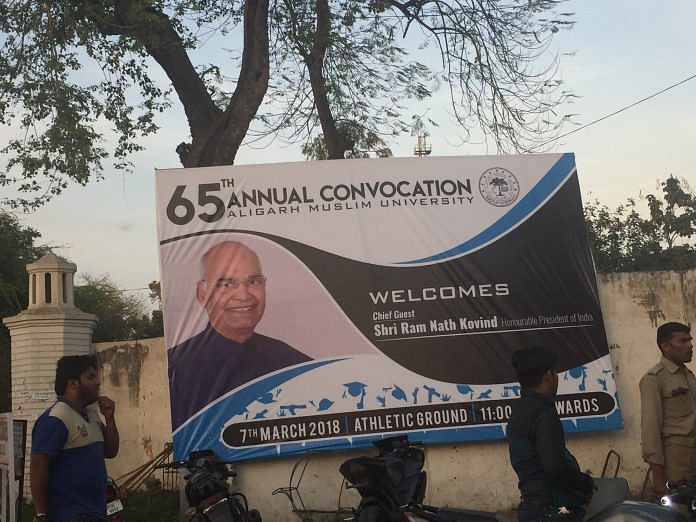For some, the new brand of AMU politics is about reform. For others, it is only a manifestation of what they see as increasingly vitiating national politics.
Aligarh: Anticipation and anxiety were locked in an uneasy co-existence at Aligarh Muslim University amid preparations to welcome President Ramnath Kovind for the institution’s 65th annual convocation ceremony Wednesday.
With police personnel marching up and down, the campus resembled a fortress. Meanwhile, arguments raged inside over whether former BJP member Kovind’s visit signified a change in status quo at the nearly-a-century-old institution, that is also India’s oldest Muslim university.
“A seed has been sown. People can’t see it yet. Students are not thinking politically, but AMU politics is changing,” said Sajad Subhan Rathar, the first Kashmiri ever elected to the AMU student union.
Rathar, who was elected the vice-president last year in a bitterly fought election, has been at the forefront of protests against the university’s invitation to President Kovind – protests that have bared open the growing fissures in the politics of India’s most prestigious Muslim institution.
For some, this new brand of AMU politics is about reform within a university which they believe has refused to move with changing times. But for others, this new politics is only a manifestation of what they see as the increasingly vitiating national politics – a politics that threatens their very identity and the right to assert it.
A new brand of politics
Dressed in a sherwani at a rehearsal for the convocation – AMU student representatives have to wear sherwanis on special occasions – Rathar asked, “Just because he’s the President, does it mean he has no ideology? And nobody can question it?”
His grouse with Kovind dates back to a statement he made in 2010 describing Islam and Christianity as “alien to the nation”.
“Even if I welcome him, I should have the right to ask him if he still believes he’s coming to an alien university, but the administration won’t let me,” Rathar said.
For him, as well as several others on campus, the controversy over Kovind’s visit is just the latest manifestation of what they see as a new brand of divisive politics spreading its tentacles slowly on campus.
“People like us wouldn’t have said anything a few years ago, but now we speak up against what we think is wrong,” said Anupam Gupta, a second-year BA student who identifies himself as a BJP supporter and follower of the Sangh ideology.
“When there is our government at the Centre and in the state, things are bound to change on campus as well,” he added.
He cited last week’s Holi celebrations as an example, saying it was the first time they had played with colours after seeking official permission from the administration, and not “just like that”.
According to Gupta, last year’s student union election marked one of the first, and starkest, signs of change.
“For the first time in the history of AMU, two Hindu students actually gave a tough fight to the Muslim candidates… They were not token candidates like in previous years,” he added.
The Hindu candidates were Ajay Singh, the grandson of BJP MLA Dalbeer Singh, and Vikrant Johri, an RSS follower. While he couldn’t say with certainty if Hindu students voted en masse for him, Johri argued there was reason to believe he did get overwhelming support from them.
Their issues as a minority were hitherto conveniently ignored by the administration, he said, but things are changing. “Sudhaar ki shuruwat ho chuki hai (The improvement has begun),” he added.
When Kasganj reached AMU
Until last year, during Ramzan, the Muslim month of fasting, Hindu students were not served food in the hostel either. “Should every Hindu student go out and eat during Ramzan? We argued our case with the administration, and they yielded,” Johri said.
According to Gupta, at AMU, talk of freedom and democracy ends when it comes to Hindus, and the environment has always been unaccepting of anyone from the BJP or the RSS. “But I don’t make any bones about my political inclinations. People are asking questions now. There is an atmosphere of secularisation,” he said.
Protests on the campus over the 26 January violence in Kasganj marked a watershed moment for this transition, he said.
Some AMU students organised a protest march demanding compensation for Akram Ali, who lost an eye in the violence, and were initially non-committal about mentioning Chandan Gupta, the 22-year old who died, Gupta said. “So Ajay and Vikrant said they will have another march demanding justice for Chandan… Ajay was put under house arrest and the march never took place… But see, at least they were able to say they’ll also protest,” he said, “Earlier that would have been unimaginable.”
‘A story of campuses around India’
For Rathar, AMU is not an isolated example. “You see the same thing in JNU,” he said. “Secularisation is fine, but they are installing RSS heads all across. Naturally, there will be pressure on minorities,” he said.
However, he wouldn’t go so far as to say politics at AMU was becoming communal. “They don’t have enough space to raise issues like Ram Mandir on campus yet, but things could change rapidly,” he added.
Johri does not deny the possibility. “If anyone asks me about Ram mandir, I will ask why there is no mandir on campus when there is a mosque,” he said, adding, “Hindus have so many festivals. Why must we be expected to go out and pray?”
Zakia Shehrbano, a PhD student who “likes to stay away” from politics, is disturbed. “What’s the point of having minority institutions then? AMU was made for a particular reason. We wanted to take everyone together, but ameliorate the condition of Muslims in particular. They are talking as though that aim has been achieved,” she said.
Alarmist as it may be, Rathar shares her view: “Soon, they’ll say Muslims can’t run AMU. Let’s be secular.”



